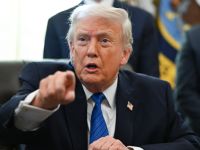Cyprus has declared war on international financial crime, adopting tough anti-money laundering laws in its drive towards EU accession, but is finding it difficult to shake off a tax-haven stigma.
"I think government anti-money laundering legislation is among the strictest in the world, and the real problem is with this image of a tax haven, which needs to be rectified," financial analyst Pambos Papageorgiou told AFP."We need to be seen to be clean and the government needs a coordinated PR campaign to address that fact."
A preferential tax regime, a web of double-taxation agreements and the country's strategic location have made Cyprus an important international financial hub. Foreign companies account for some five percent of the island's GDP, while resident international companies are important employers.
"The fact that Cyprus is an international business center brings it under scrutiny, but I don't think all this (bad publicity) is really justified because it is doing everything that it needs to do to combat money-laundering," Phidias Pilides of PricewaterhouseCoopers said. "You can never safeguard 100 percent, but Cyprus is minimizing any exposure to money-laundering."
Even though Cyprus has managed to stay off offshore tax haven blacklists by satisfying international monitoring bodies, damaging allegations abound. Only last week it was forced to give a roll call of international organizations backing its stance on money-laundering when ex-CIA director James Woolsey was quoted in Italian daily La Repubblica as saying Cyprus was a conduit for Usama Bin Ladin's treasure.
The unwanted allegations were accompanied by other media reports linking the island to the prime suspect for the September 11 suicide attacks on the United States. "We are happy the government, in the last two to three years, has made a concerted effort to remove its money-laundering tag, and we look forward to it taking further steps in lifting this shadow," Cyprus International Business Association (CIBA) president Mehran Eftekhar said.
Eftekhar blames the "ignorance" of foreign journalists by not distinguishing between the government-controlled south and the Turkish-held north of the island. "The problem is there are ignorant journalists, say in America, that don't make the distinction between north and south Cyprus. They should make clear that north Cyprus is a money laundering center." This view was backed by Papageorgiou. "Bin Ladin was using banks in the occupied part to fund organizations."
A decade ago the image of Cyprus as a safe haven for dirty money may have been justified, but a raft of legislation approved as part of the drive for European Union membership has enabled the island to clean up its act. "What is happening now was not in practice ten years ago ... there has been OECD pressure for greater transparency," said Eftekhar.
The fact that the IMF, the G8's Financial Action Task Force, the EU, the Council of Europe and the OECD have all given Cyprus a clean bill of health is testimony to its efforts against financial crime. The latest pat on the back came from the IMF, which issued its report in July, after carrying out an inquiry at the government's request.
Cyprus had grown accustomed to tarnishing media allegations suggesting offshore banks held fortunes belonging to deposed Yugoslav leader Slobodan Milosevic or the ill-gotten gains of the Russian mafia. "There are elements about a Yugoslav and Russian influx, but to be honest there is a much bigger problem in Guernsey, Jersey, Isle of Man, London and New York and next door neighbor Israel," said Eftekhar.
He said offshore banks like Barclay's and HSBC have installed their own internal money-laundering measures. Despite denials, Cyprus was strongly associated with deposed Yugoslav leader Slobodan Milosevic's money laundering during his rule.
Last December 1, the Yugoslav National Bank said US Treasury officials had traced one billion dollars of Milosevic's treasure chest to secret accounts in Cyprus. And Cyprus sent 25 boxes of files of possible evidence against the disgraced Yugoslav leader to the UN war crimes tribunal at The Hague.
Yugoslav authorities allege Cyprus was a key money-laundering center for Milosevic during his rule, when an estimated four billion dollars vanished. It was also regarded as a safe haven and laundering center for the Russian mob after the break up of the Soviet Union.
US authorities estimated that one billion dollars a month was being laundered through Cyprus in 1997 and 1998 in the post-Soviet era. But earlier this year, the US Treasury declared Cyprus a "model" for the region because of the raft of anti-money laundering legislation now in place.
"We have introduced tougher legislation in our continued effort to clamp down on money-laundering," government spokesman Michalis Papapetrou told AFP. As part of the ongoing campaign Attorney General Alecos Markides has proposed the authorities should not wait for EU directives but go it alone and implement pioneering legislation to safeguard the island's "clean reputation". ― (AFP, Nicosia)
by Charlie Charalambous
© Agence France Presse 2001
© 2001 Mena Report (www.menareport.com)







